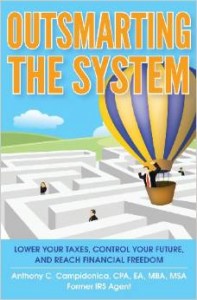
I recently received an email from Tony Campidonica asking me to review his book Outsmarting the System: Lower Your Taxes, Control Your Future, and Reach Financial Freedom. Since I am always up to hear new advice and different ways to achieve financial freedom, I agreed. I glanced through a few of the reviews on Amazon, and was fairly prepared for the book. Here are my key takeaways.
Published by ScioPress, Inc.
The first thing I did before I even began to read was check to see who published the book. If you don’t do this, I recommend you start for two important reasons. First, a well-known publishing company does not publish just anything that comes through its doors. In fact, to get published with some of the larger companies, you have to have an agent that works with them; they don’t accept inquiries. Second, there are self publishing companies out there that will publish anything as long as they are paid to do so. ScioPress, Inc. is a self publishing company. Does this mean Tony’s book is any less credible? Absolutely not. But it does mean it should be read with a little more caution.
The Concepts
The entire idea behind Tony’s book is that if you are going through life the way that we are taught (go to college, get a job, save, retire); you are doing it the hard way. He uses the first few chapters to talk about how putting aside money this way is actually designed by the government to maximize the amount of taxes that you pay. I paraphrase his example:
Suppose you make an investment in a retirement account. When you withdraw it you have $100 in gains. Since you are in the 25% tax bracket you pay $25 in taxes.
Suppose you make that same investment in a non-retirement account. You withdraw it more than a year later. Since you are in the 25% tax bracket you pay capital gains taxes of 15%, or $15.
We have been taught and pushed our whole lives that saving in retirement accounts is the best way to go, yet the tax structure is clearly designed to favor those who save in non-qualified accounts.
After setting up the problem, the book describes the solution. In order to best avoid taxes, a person should minimize the amount of earned income they have (wages, or earned income, is taxed at the highest possible rate). Instead, they should seek to have investment income, landlord/rental income, or small business income. In as few words as possible, the book describes why these forms of income work best for maximizing profits and minimizing taxes. A quick look at Mitt Romney’s tax return (Romney’s was used due to its ease of access) shows that he is utilizing these very same concepts; reporting very little income as a result of wages and keeping his overall tax rate under 15%.
Wrapping it Up
I was a little skeptical going into reading Tony’s book. First, I knew that he was trying to garner more attention for it by asking for a review, and second the fact that it was self published. However, after I read about half of the book I knew that even implementing some small changes in the way I earned my money would result in savings that made the book worthwhile. I did get a little hung-up toward the end where he started delving deeper into tax laws and how audits were performed; I found those were not necessary to the rest of the subject matter. Overall the book was well written, easy to read, and laid out clearly that if you want to minimize your taxes, do it like this.
